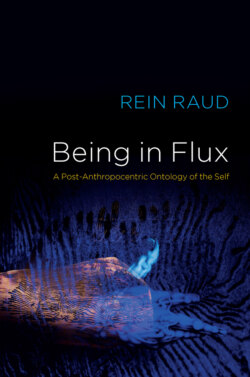Being in Flux

Реклама. ООО «ЛитРес», ИНН: 7719571260.
Оглавление
Rein Raud. Being in Flux
Table of Contents
Guide
Pages
Being in Flux. A Post-Anthropocentric Ontology of the Self
Copyright Page
ACKNOWLEDGEMENTS
EPIGRAPH
INTRODUCTION
Notes
1 ONTOLOGY: SOME OF THE STORY SO FAR
Objects and properties
Two kinds of essentialism
Identity and continuity
Substance vs. pattern continuity
Process philosophies
Multiplicities and networks
Back to objects?
Critique of the critique of critique: excess and change
Ontological priority, antigradualism and counterfactuals
Methodological perspectivism
If disease is not a ‘thing’, then what is it?
Social constructionism
Accommodating anti-representationalism
The theory of assemblages
Gaze and relationality
Summary
Notes
2 AN ONTOLOGY OF PROCESSES AND FIELDS
The tradition
Ontological tiers
Gradients and thresholds
Properties and capacities
Relations
Matter as emergence
Minimal instances of being
Field ontology
What is a process?
Internality
Game changers
Time regimes
Causality
Causal laws
Initialism
Memory and desire, cell and lens
Summary
Notes
3 ME, MYSELF AND MY BRAIN
Consciousness and mind
Thresholds of evolution
Mind on a gradient
Are we our brains?
From brain to mind
And I think to myself …
The decision-making focus
The core self
Combat vs. constitution
United states of mind
The mind and the world
The self as a field
Summary
Notes
4 THE SELF AS AN EXTENDED DECISION-MAKING NETWORK
The body
Bodythink
From movement to agency
Agency as self-realization
Agency and temporality
Future-in-itself
Mental causation
The extended network
From cognition to action
Responsibility
The flattened image
Collective selves?
Modes of joint action
Performative inclusion
Shared or joint cognition?
Summary
Notes
CONCLUDING REMARKS
REFERENCES
INDEX
POLITY END USER LICENSE AGREEMENT
Отрывок из книги
Rein Raud
My sincere thanks go to Michael Krämer, Vanina Leschziner, Graham Parkes, Chiara Robbiano and Fernando Vidal, who read and commented on previous versions of the book or sections of it – the argument has benefited so much from your input! A deep bow is also due to the anonymous reviewer of the book for Polity, who found only praise for it, despite acknowledging that they disagree with me on all philosophical counts – I am very glad to know that such breadth of mind is still to be found in this world.
.....
It should be clear by now that I am going to reject the set of methodological axioms of ‘hard’ physicalism (‘everything that is real can be most adequately described in the language of physics’), which is considered to be the prerequisite of scientific thought by a large number of philosophers. At the same time, however, I will admit the possibility of ‘weak’ physicalism (‘everything that is real can also be described in the language of physics’), without, however, considering it to be very informative. The problem with ‘hard’ physicalism consists in its self-centredness – I am going to argue that there are real phenomena with real causal powers that cannot be adequately accounted for by their reduction to underlying specific physical processes, while a physical description, albeit often a clumsy one with little or no explanatory power, can nonetheless be constructed for them.
In other words, I will argue that the mental and physical vocabularies we normally use need not match each other on a one-to-one basis. Moreover, we need to be very wary about the tacit conceptual luggage the opposite view often brings with itself. For example, we may freely admit that all mental processes that we can think of are somehow also physical processes that occur in the brain – that is, individual mental events have an equivalent in the physical structures of the brain. But this fact does not mean that we are entitled to posit a self-same ‘neural correlate’ for any occurrence of a (similarly reified) particular ‘mental state’ or experience processed by the mind. More importantly, it does not follow from this that each aspect of the mental process we are accustomed to identify as one of its recurring elements has a precise, always co-occurring neural correlate across individuals – so that all fans of a specific football team, for example, have a number of neurons of exactly the same type associated with one another in exactly the same way located in exactly the same area in their brains. A claim of this type, put forward in the nineteenth century by the amateur physiologist and philosopher George Henry Lewes (1877: 313) as a conjecture, has indeed not been substantiated by neuroscience, and yet the impression one often gets from neurocentrically oriented philosophical literature is that this is how things really are.7
.....